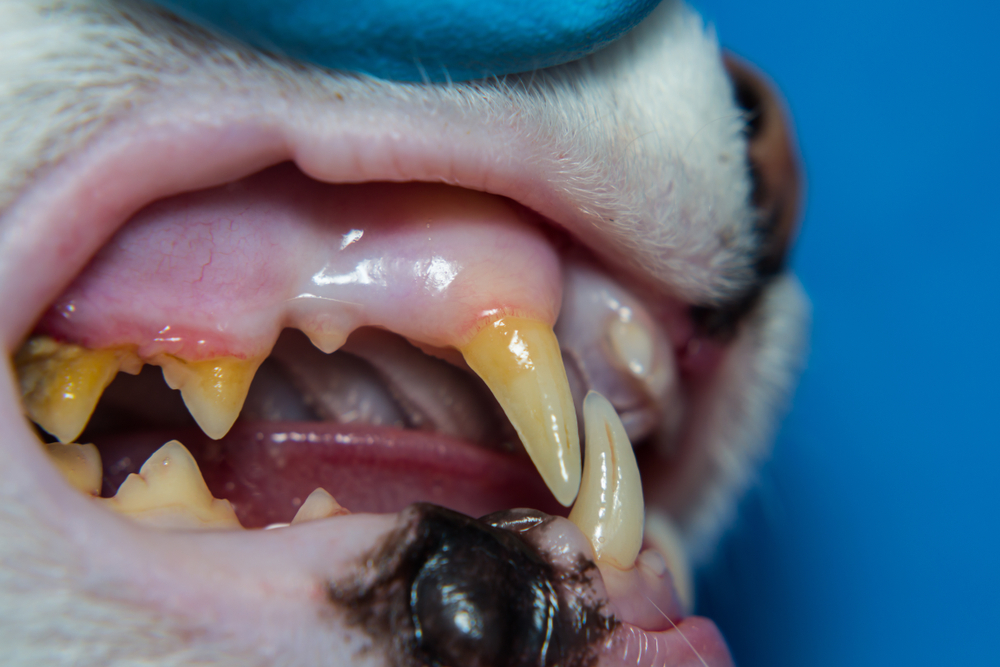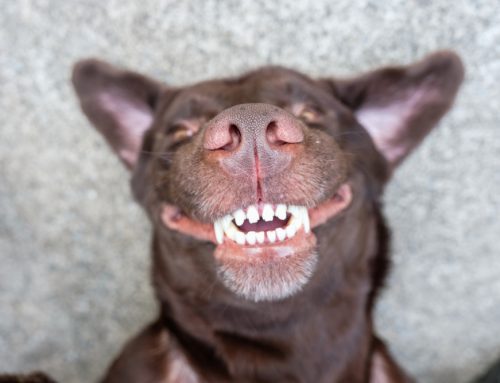February is National Pet Dental Health Month, but pet dental health should be celebrated every day. Proper oral care is vital for your furry friend’s overall health and well-being, not only for a clean mouth. Here are 10 reasons highlighting why your best friend’s dental health is so important.
#1: Good dental hygiene equals fresh breath in your pet
Although you love your pet dearly, you may not always love her breath. While a slight breath odor is normal, a stronger smell can signal serious dental disease. By engaging in routine dental care, such as daily toothbrushing, you can help banish the oral bacteria that cause your pet’s bad breath, and enjoy her kisses again.
#2: Preventive dental care for your pet saves you money
Some pet owners are reluctant to pay for a procedure, when nothing seems wrong with their pet. But, without budgeting for routine preventive dental cleanings, you may not only cause your pet unnecessary pain, but also end up paying much more to treat serious periodontal problems. Since pets are highly skilled at hiding pain and illness signs, and more than half the tooth’s structure is hidden beneath the gumline, you may not notice dental disease in your pet until it has advanced.
#3: Most pets have some form of dental disease
If your pet is over age 3, there is a good chance that she has some level of dental disease. In fact, up to 85% of pets over age 3 have dental disease, and some toy and small breeds begin accumulating tartar as soon as their adult teeth develop at 6 months of age.
#4: Dental disease can harm your pet’s entire body
Periodontal disease affects not only your pet’s breath, teeth, and oral cavity, but can also infect her entire body. As bacteria attack your furry friend’s teeth and gum tissue, they work their way into her bloodstream, traveling throughout her body, and harming organs, such as the heart, liver, and kidneys. Oral bacteria especially enjoy camping out on heart valves, which can lead to heart disease.
#5: Brushing your pet’s teeth is the best at-home dental care
Although a variety of dental-care products can slow plaque and tartar accumulation, nothing is as effective as daily toothbrushing. Armed with a toothbrush, you can attack sticky plaque before it hardens into cement-like tartar, helping reduce the bacteria in your pet’s mouth.
#6: Retained baby teeth can cause your pet problems, too
Adult cats have 30 teeth, while adult dogs have 42, but they will have more if their baby teeth fail to fall out naturally. Small-breed dogs, which already have crowded mouths, are the most prone to retaining their baby teeth, leading to too many teeth packed into a too-small space. This overcrowding can cause rapid tartar accumulation and gingivitis, so we recommend extracting your pet’s retained baby teeth to avoid damaging her adult teeth.
#7: Pets need regular dental care as much as people
We brush our teeth daily and visit our dentist regularly, so why should our pets be different? Since so many pets have dental disease that can lead to other health issues, we highly recommend routine dental-wellness exams to evaluate your pet’s oral health.
#8: Dental check-ups can discover early dental disease
Pets are excellent at hiding pain and illness, which may mean that you won’t notice dental disease until it has advanced, causing your pet unnecessary suffering. Through regular dental exams, we can monitor your pet’s dental health, and address issues immediately before they cause serious problems.
#9: Digital dental X-rays are an important part of your pet’s professional dental care
With as much as 60% of the tooth hidden below the gumline, we are not likely to find all your pet’s dental-disease signs with only a regular physical exam. We recommend dental-wellness exams, as well, where we will take full-mouth dental X-rays to check for tooth resorption, retained teeth, tooth-root fragments, abscessed teeth, bone loss, and other hidden problems, and avoid missing a painful condition.
#10: Without a comprehensive dental-care routine, your pet may need diseased teeth extracted

No pet owner wants to hear their beloved companion has diseased teeth that need extraction, despite knowing their pet will be much more comfortable after the procedure. By sticking to a daily, at-home dental-care program, and scheduling regular professional dental care with our team, you can prevent your pet’s dental disease from advancing to the point of needing extractions.
Is your pet’s breath knocking you over? Serious dental disease could be the problem, so call us to schedule a dental-wellness appointment.









Leave A Comment